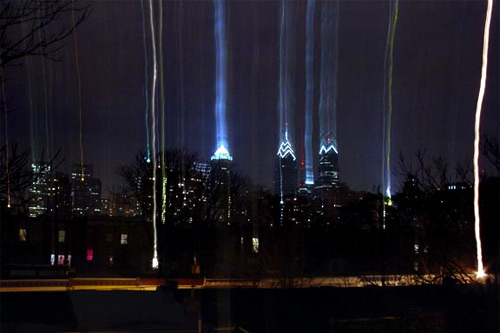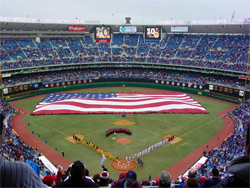
by Nathaniel Popkin
April 4, 2008
I've only missed two Philadelphia springs since 1988, the last being a decade ago, in 1998. Beau Monde, at 6th and Bainbridge, opened then, while I was bungling
French at photo
school in Paris and my wife Rona was learning how to make sauces at the Ritz Escoffier. When we reappeared in Philadelphia, partners David Salama and Jim Caiola
hired her to work the
crêperie's prep kitchen. Rona didn't work for David and Jim long, but since then, they've seen us through a bundle of milestones, including a dinner (and
celebratory bottle of
wine) during Rona's labor with our first kid, Lena, and the book-signing party when my book, Song
of the City,
came out.
Since that first spring of 1988, April in Philly has always made me feverous; I spent hours studying in what was 19th century banker Clarence Clark's arboretum at
42nd and Locust (now
Penn's Sadie Alexander school) and in Clark Park, barefoot, petals in the grass. Nowadays winter ends and I long to lounge around the azalea garden behind the Art
Museum and read the
paper and watch newlyweds amidst the coral and hyacinth; in the magnolia garden near Fourth and Locust (near resplendent now) I'll doze and the kids will play in
the broken fountain.
Lena, apparently, has inherited the genes: this past 50 degree Sunday, in t-shirt, shorts, and flip-flops, she dragged a bean bag chair outside and sprawled
herself across our stoop.
More than one passer-by still in winter coat had a good chuckle.
This year, despite or because of the lingering cool air, the pear tree flowers seem brighter and more delicate than ever. In the evening the spearmint-striped
cherry blossoms outside
of Beau Monde catch the light from the streetlamps, forming a little solar system against the moonless sky. And come morning, daffodils, like little suns, shine
all over. It's
spring in Philly. The blossoms will fall then turn brown, and the wind will take them away.
 In 1988, Reagan still President, the Phils won three after losing to the Pirates at the Vet on opening day. Then they lost seven straight. As we saw in the photo
essay Joe Minardi
presented yesterday, with all those parking lots, Center City looked a little more like Charlotte and a little less like Guangzhou; then as now there was a brand
new icon on the
skyline and a few cranes propped up against recession. A massive site was cleared for the Convention Center.
In 1988, Reagan still President, the Phils won three after losing to the Pirates at the Vet on opening day. Then they lost seven straight. As we saw in the photo
essay Joe Minardi
presented yesterday, with all those parking lots, Center City looked a little more like Charlotte and a little less like Guangzhou; then as now there was a brand
new icon on the
skyline and a few cranes propped up against recession. A massive site was cleared for the Convention Center.
It's gratifying to think about all we've done in two decades, how we show ourselves off now (in ways we couldn't have imagined); how we've adapted the economy; how
we've allowed
ourselves to dream. Because of all that and more, for a lot of people, today Philly's an easier, more compelling, and more rewarding place to live.
There's another anniversary today, lest we forget why skyscrapers and cherry blossoms sometimes leave us cold. On April 4, 1968, Martin Luther King, who had just
begun to press his
joint case against the war in Viet Nam and against unfettered capitalism, was assassinated in Memphis. As I noted in last week's City Paper, King's death marked the beginning of the end of ambitious urban
policy. (Explicit
urban policy continued to evolve -- from urban renewal, anti-poverty, and work programs to enterprise and empowerment zones -- after King's death, but finally died
during the Clinton
administration.) The failure of civil rights to fundamentally alter the economic well-being of the urban poor is an ample metaphor for the failure of urban policy
to end the decline
of our ghettos. Scholars say that civil rights moved its focus away from addressing economic inequality toward softer targets in integration, psychology, and
cultural enrichment. We
might say the same of urban policy. Today there is little talk of poverty and justice. Instead, we grapple with urban design, infrastructure, and
transportation.
Inga Saffron wrote yesterday
that not even this
sort of urban policy-lite has entered any of the presidential candidates' rhetoric. Indeed, Bruce Katz, the Brookings policy expert she cites, mentions that
transit and
infrastructure ought to be presidential priorities. Economic issues, housing, and crime aren't among them.
But what is and what ought to be urban policy? The movement away from social and economic justice towards physical planning, design, and enhancing street life
reflects a change in
approach as well as the political reality of war, low taxes, and scarce resources. Economic inequality is caused in part by regressive taxation. That's a
national problem (with
great urban implications, of course) that can't be addressed at the local level. It is the same with immigration, healthcare, and energy policy. Imagine a $3
dollar per gallon
increase in the gas tax. Wouldn't that be the most profoundly pro-city policy of all? In this regard, Saffron's point that the candidates are ignoring cities may
be technically but
not effectively true. We'll have to see what Clinton, Obama, and McCain say about those key issues -- taxation/redistribution, energy, and immigration -- to
understand their
potential effect on cities.
Of course we'd like to hear one of the candidates say he or she loves cities and understands their critical role in the development of technology and civilization,
in reducing carbon
emissions, in fostering a functioning, multi-ethnic democracy. Wouldn't you be astounded if one of them talked about historic preservation -- or gun control?
In 1998, as America got stupid over a little excess pleasure in the Oval Office, Rona and I waited in vain for springtime to come to Paris. I bought ranunculus
and primroses for our
little apartment; Rona went to see Titanic. The French papers were full of stories about the American economic miracle. (The Phils, by the way, lost to the
Braves on April 4, to
fall to 1-3.)
–Nathaniel Popkin
nathaniel.popkin@gmail.com
For Nathaniel Popkin archives, please see HERE, or visit his web site HERE.
For The Possible City, please see HERE.
|